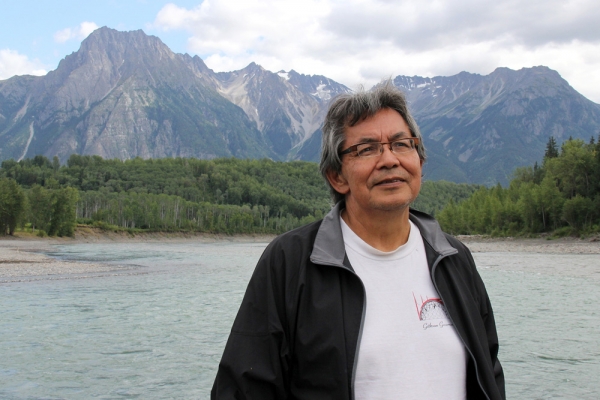Gitxsan First Nation Healers Urge Residential-school Survivors to Open up and Reflect
By Travis Lupick
Gary Patsey’s Gitxsan First Nation name is Kaliskalan. Loosely translated, it means “last man up the river”, he told the Georgia Straight recently over coffee in Hazelton, in northwestern B.C. In a separate interview, Dimdiigibuu, whose English name is Ardythe Wilson, told a story that revealed the path on which Patsey was set when he was given that title upon his birth. “We’ve had a generation of people Gary’s age who have died,” Wilson began. “Most of his friends are gone. He struggles, almost alone, as a lone voice of his generation, calling out for some kind of recognition of the impacts of residential schools. And he’s doing that because that goes a long way in starting the healing process.” Wilson, a program coordinator for the Gitxsan Child and Family Services Society, explained that First Nations people still feel the psychological trauma inflicted on them through Canada’s residential schools. The last such facility designed for assimilation, in Saskatchewan, closed in 1996, she said, and many former students died when they were still young. Depression, chronic alcoholism, drug abuse, suicide, and degenerative diseases remain common problems among survivors. At the Historic B.C. Cafe, Patsey recalled years he spent trying to suppress memories of his time at a residential school outside Edmonton. “Me, I struggled,” he began. “I was a drinker. I got into trouble. I had to straighten up. I had to learn my gwalx ye’insxw, my inherency [cultural heritage], and rediscover it.” Today, he helps others do the same, working as a volunteer at the Wilp Si’satxw Community Healing Centre in Kitwanga, a small town in southern Gitxsan territory. With the number of Gitxsan residential-school survivors dwindling, Patsey said he now mostly counsels their second-, third-, and even fourth-generation offspring. “This trauma has been transmitted to the next generation,” he explained. “We talk about what the story is behind residential schools, about what it means to kill the Indian in a child.” Patsey described that process of healing though conversation as the siilaxnok of your ots’in, the realignment of your spirit. “Some of the things that I talk about are exactly what was denied to us at residential schools, like the basics of being Gitxsan: your identity, your essence, and who you are,” he said. “I ask them if they know, ‘What happened to you? What happened to your mom and your dad? Do you understand why they behave the way that they do? Why they are silent? Why there is a deep grief? Why there is a sadness? And how can we fix it?’ ” Patsey pointed to research conducted by the Aboriginal Healing Foundation, an Ottawa-based nonprofit resource centre that focuses on reconciliation and holistic healing. A 2005 AHF research paper paints a comprehensive picture of the psychological and spiritual impacts of residential schools. It describes how students were systematically taught to feel ashamed of their families and who they are. “Although not all children were physically or sexually abused at residential schools, traumatic disconnections from their families, communities, languages and culture had far-reaching, historical impacts,” that document concludes. It’s estimated that more than 150,000 aboriginal children passed through federally run residential schools from roughly the time the Indian Act was passed in 1876 to when the last institution closed. Altogether, more than 4,000 children died and thousands more were abused physically or sexually. Wilson noted that the Gitxsan are based in Canada’s relatively remote northwest, and colonialism arrived there later than it did in other regions of Canada. But she stressed that the impacts were severe. She pointed to her own daughter as just one example of the generational consequences that Patsey attempts to address. Wilson was never subjected to the residential-school system herself, but her husband was. As a result, he never learned to speak the Gitxsan language with fluency. Today, she continued, that affects how their daughter experiences Gitxsan culture. “I can’t always speak Gitxsanimaax to her, because her father wouldn’t understand,” she said. “The teaching of that part of his culture was broken.” Wilson described First Nations leaders as too often silent when it comes to residential schools. She called on them to support people like Patsey, who are helping younger generations understand what occurred.
|
.
Any original material on these pages is copyright © BishopAccountability.org 2004. Reproduce freely with attribution.
